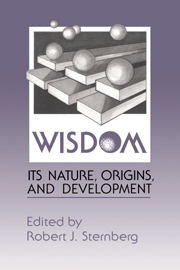Book contents
- Frontmatter
- Contents
- List of contributors
- Preface
- Part I Approaches to the study of wisdom
- Part II Approaches informed by philosophical conceptions of wisdom
- Part III Approaches informed by folk conceptions of wisdom
- Part IV Approaches informed by psychodevelopmental conceptions of wisdom
- 9 The loss of wisdom
- 10 Wisdom and Reflective Judgment: knowing in the face of uncertainty
- 11 Wisdom: the art of problem finding
- 12 An essay on wisdom: toward organismic processes that make it possible
- 13 Conceptualizing wisdom: the primacy of affect–cognition relations
- Part V Integration of approaches and viewpoints
- Name index
- Subject index
9 - The loss of wisdom
Published online by Cambridge University Press: 05 June 2012
- Frontmatter
- Contents
- List of contributors
- Preface
- Part I Approaches to the study of wisdom
- Part II Approaches informed by philosophical conceptions of wisdom
- Part III Approaches informed by folk conceptions of wisdom
- Part IV Approaches informed by psychodevelopmental conceptions of wisdom
- 9 The loss of wisdom
- 10 Wisdom and Reflective Judgment: knowing in the face of uncertainty
- 11 Wisdom: the art of problem finding
- 12 An essay on wisdom: toward organismic processes that make it possible
- 13 Conceptualizing wisdom: the primacy of affect–cognition relations
- Part V Integration of approaches and viewpoints
- Name index
- Subject index
Summary
Our wisdom, we prefer to think, is all of our own gathering, while, if the truth be told, it is, most of it, the last coin of a legacy that dwindles with time.
– Evelyn Waugh (1945)A contemporary image of wisdom typically associated with presumed Eastern philosophies is of the experienced, enlightened, and respected elder. Yet Erikson (1982, p. 79) has reminded us that the name of Lao-tze, the founder of Taoist philosophy, means old child and refers to a newborn with a tiny white beard. Is it possible that in associating wisdom with old age we risk losing sight of what is the true essence of wisdom, an essence that in its simplicity is within the reach even of a child? With this possibility in mind, I have first endeavored to consider what might be the nature of wisdom apart from its association with age. In doing so, I have concluded that the essence of wisdom is to hold the attitude that knowledge is fallible and to strive for a balance between knowing and doubting. Second, I draw support for this conception of wisdom from the research literature on wisdom. Third, I consider the question of whether wisdom increases with age and conclude that support for this hypothesis is lacking. Fourth, I suggest that although the potential for wisdom is present throughout the life course, unfortunately most people lose their wisdom as they grow older.
- Type
- Chapter
- Information
- WisdomIts Nature, Origins, and Development, pp. 181 - 211Publisher: Cambridge University PressPrint publication year: 1990
- 99
- Cited by



